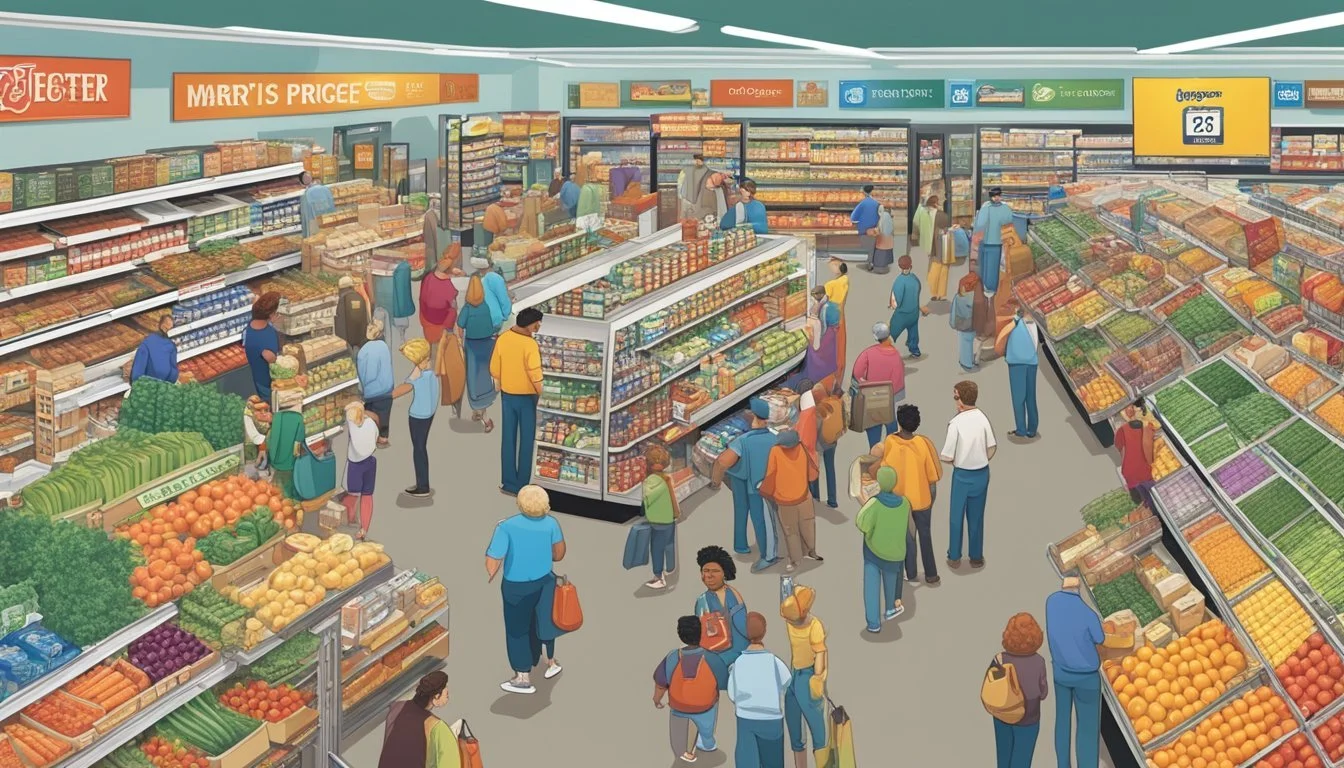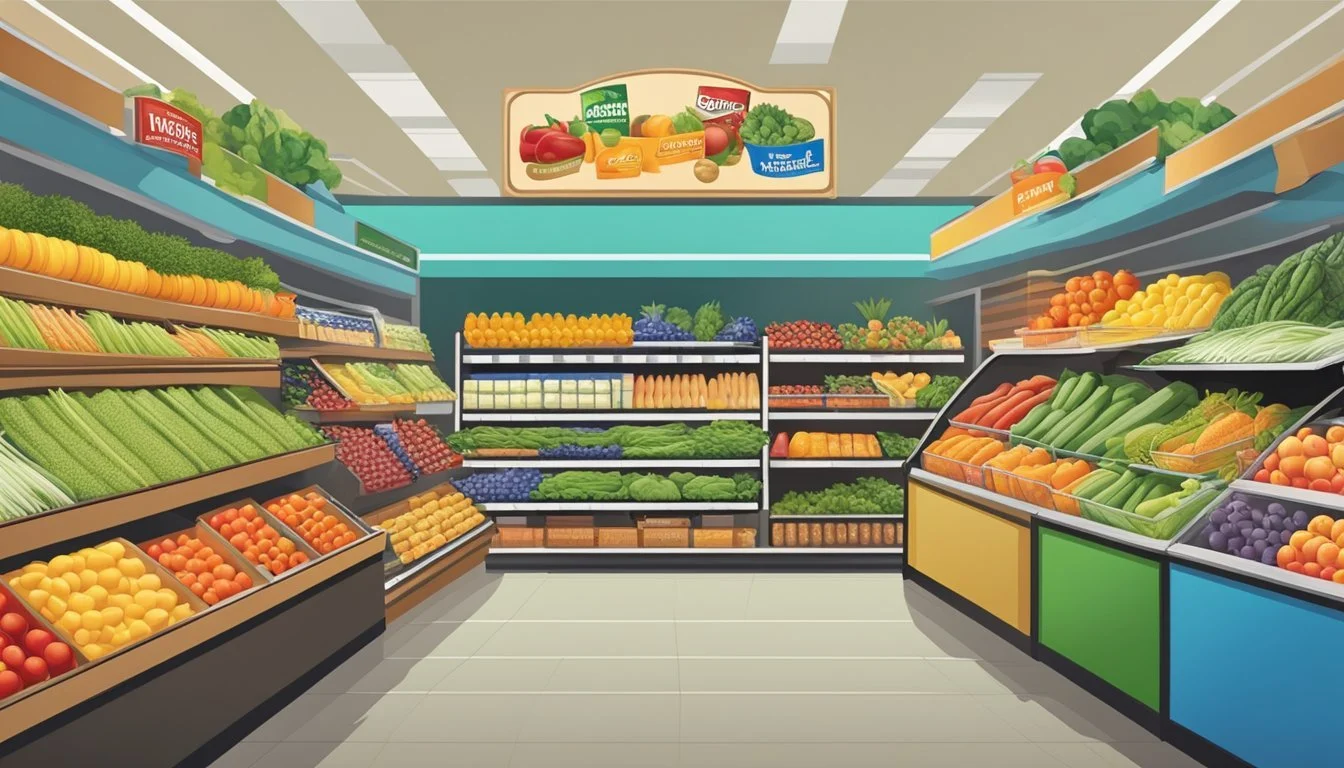Kroger vs Harris Teeter
Comparing Shopping Experience and Value
Part of Our Grocery Store Guide with Details on Kroger and Harris Teeter
When it comes to grocery shopping, two stores often come to the forefront of the American consumer's decision-making process: Kroger and Harris Teeter. Both stores have carved out significant space in the grocery store industry, but they also come with their distinct approaches to pricing, product selection, and overall shopping experience. Customers are frequently seen debating which one offers the better deal and which aligns with their shopping preferences.
In the competitive world of supermarkets, Kroger presents itself as a cost-effective choice. It is widely recognized for offering various categories of goods, typically ranging from 11% to 55% cheaper than its competitor Harris Teeter. This price difference is especially evident in six out of eight common shopping categories, cementing Kroger’s reputation as a store where shoppers can get more for their money. Various options are available for those who prefer to shop from home, including a reasonable delivery fee structure that appeals to both one-time and regular online shoppers.
Harris Teeter, while often perceived as the pricier option, strives for a different market position. The store appeals to customers looking for a particular shopping experience or specific products. In essence, determining which store is "better" is not simply about pricing. It involves considering an array of factors, including store policies, the quality of goods, the shopping environment, and additional services offered. As consumers weigh these considerations, they must identify which factors have the most impact on their personal grocery shopping experience.
Company Overview
When comparing supermarket chains Kroger and Harris Teeter, it's crucial to understand their origins and evolution. Both have established themselves as key players in the grocery store arena, with distinct histories and expansions that have shaped their roles today.
History of Kroger
Kroger stands as one of the largest grocery retailers in the United States. Barney Kroger invested his life savings of $372 to open the first Kroger store in 1883 in Cincinnati, Ohio. The grocery chain distinguished itself by being a pioneer in the concept of the modern grocery store, combining groceries, meat, and bakery products under one roof. Over the decades, Kroger expanded tremendously, not only through organic growth but also by acquiring numerous supermarket chains. This expansion strategy positioned Kroger as an influential force in the grocery sector.
History of Harris Teeter
Harris Teeter started its journey in 1936 when William Thomas Harris and Willis Teeter opened their first stores in North Carolina. Over the years, they merged their separate establishments to form Harris Teeter, a chain known for a strong emphasis on customer service and quality produce. Harris Teeter further solidified its presence by excelling in fresh and perishable items, along with a considerable private label offering. In 2014, Kroger acquired Harris Teeter, effectively bringing it under the Kroger company umbrella and expanding Kroger's reach into new markets.
Store Presence
In assessing the store presence of Kroger and Harris Teeter, geographical location and the density of stores are critial factors. Both grocery chains have a significant presence, yet their influence varies across regions.
Location and Reach
Kroger operates a vast network of supermarkets across the United States. As of 2024, consumers can find Kroger's stores in a significant number of states, affirming its status as one of America's largest grocery retailers. The brand's strategic store locations ensure accessibility for a diverse demographic.
Harris Teeter, while not as widespread as Kroger, has a strong presence in the southeastern United States. The supermarket focuses on providing services in the East Coast, maintaining a concentrated reach especially in states like North Carolina. Harris Teeter's specific location strategy caters to the East Coast market.
East Coast Influence
Harris Teeter's influence is particularly notable in the East Coast. The chain solidifies its presence with numerous stores strategically situated within the Washington D.C. area and throughout the district. Recognized among Washington area grocery chains, Harris Teeter tailors its offerings to the region's distinct consumer base.
Conversely, Kroger, despite not having stores in the D.C.-area, wields significant market influence on the East Coast through its subsidiary, Harris Teeter. Its purchase of Harris Teeter has expanded Kroger's reach, effectively adding the East Coast to its already extensive supermarket portfolio.
Price Comparison
In analyzing Kroger and Harris Teeter, price is a fundamental factor for consumers. The comparison reveals which store offers more cost-effective options for shoppers.
Everyday Pricing
Kroger often emerges as the more budget-friendly choice for shoppers regarding everyday pricing. A comparison showcases that Kroger's prices are lower than Harris Teeter's by a significant margin. For instance, Kroger has been found to be cheaper in several key grocery categories, with savings ranging from 11% to 55%. The bulk of everyday items such as produce, meat, and dairy tend to be more affordable at Kroger.
Category Kroger Harris Teeter Produce Cheaper More expensive Meat Cheaper More expensive Dairy Cheaper More expensive
Discounts and Deals
Both Kroger and Harris Teeter offer a variety of discounts and deals which can lead to additional savings beyond everyday low prices. Kroger frequently promotes loss leaders - products sold at a loss to attract customers into the store. Harris Teeter, on the other hand, often provides exclusive deals to its reward program members, arguably making their discount strategy more selective. While both stores have weekly sales and promotional items, Kroger's broader approach to discounts may present more opportunities for savings across a range of products.
Kroger: Weekly sales, loss leaders, digital coupons
Harris Teeter: VIC card member deals, e-VIC coupons
Product Selection
When evaluating grocery stores like Kroger and Harris Teeter, product selection plays a pivotal role in consumer choice. This includes the quality of items, the variety of brands, and the availability of organic and health options.
Quality of Items
Kroger and Harris Teeter both pride themselves on offering high-quality items across various departments. Kroger claims affordability without compromising the quality, especially in its store brand products. Harris Teeter often emphasizes the freshness of its produce and meat, suggesting meticulous selection processes to ensure consumer satisfaction.
Variety of Brands
Both retailers stock a diverse range of brands, satisfying different customer preferences. Kroger tends to have a broader range, including:
National brands: A wide selection that caters to all consumers.
Store brands: Such as Kroger brand, which offers competitive pricing.
Harris Teeter also offers:
National and specialty brands: Targeting consumers looking for specific names.
Store brands: With a focus on a balance between quality and value.
Organic and Health Options
The demand for organic and health-oriented products has become a priority for many shoppers. Kroger offers an extensive variety of organic food, including fresh produce and packaged items, under its Simple Truth brand. Harris Teeter responds to this trend with its own line of organic products, ensuring that customers have access to healthy choices. Both have made strides in increasing their stock to include gluten-free, non-GMO, and other health-conscious options.
Customer Experience
When evaluating a grocery store, customers often prioritize the shopping atmosphere which encompasses service quality, store cleanliness, and checkout efficiency.
Service Quality
Customers frequently report Kroger to offer competitive service quality, with various departments staffed by knowledgeable employees. The availability of assistance on the shop floor is a noted strength. Harris Teeter doesn't lag far behind, often receiving positive feedback for friendly staff and helpful customer service.
Store Cleanliness
In terms of cleanliness, Harris Teeter usually garners appreciation for its well-maintained stores. The aisles and public spaces are consistently kept clean, creating a welcoming environment for shoppers. Kroger also places emphasis on cleanliness, though the experience may vary more widely from store to store.
Checkout Efficiency
Kroger has initiated multiple checkout options to improve efficiency, including self-service stations and mobile checkout applications to expedite the process. Comparatively, Harris Teeter also strives for a swift checkout experience, with some stores rated highly for short wait times and efficient service, enhancing the overall convenience for customers.
Private Label Brands
When comparing Kroger and Harris Teeter, the selection and quality of their private label brands play a significant role in consumer preference. Both stores offer an array of store-brand products aimed at providing value without compromising on quality.
Kroger Brand Products
Kroger's private selection brand is designed to deliver a superior culinary experience at a competitive price. Their product range is extensive, including high-quality cuts of USDA Choice beef, which is a cut above the standard when it comes to quality. Also notable within their private label range are their non-dairy milks, salad dressings, and seasonings, striving to cater to various culinary needs and preferences.
Harris Teeter Brand Products
Harris Teeter brand products emphasize quality and value, offering a variety of grocery items that adhere to high standards. Although not as widely compared in this context, the Harris Teeter brand provides a commendable range of products, including their gourmet or premium selections, designed to compete with other quality private labels. The specifics regarding USDA Choice beef and other distinguishable factors within the Harris Teeter brand were not highlighted in the provided sources.
Additional Services
When comparing Kroger and Harris Teeter, it’s worth examining the additional services they offer, especially in terms of online shopping and delivery, as well as specialty services that may enhance the shopping experience for customers.
Online Shopping and Delivery
Kroger provides customers with an efficient online shopping platform. They charge a delivery fee of $4.95 for single orders and offer an annual subscription for $99.95 that covers unlimited deliveries, appealing to those who frequently shop online. In contrast, Harris Teeter also offers online shopping options with assorted grocery delivery choices. Both stores accept all major credit cards, facilitating a smooth transaction process. These services are particularly beneficial for customers who prefer shopping from the comfort of their home or are unable to visit the stores physically.
Kroger Delivery Fees:
Single Order: $4.95
Annual Subscription: $99.95 (unlimited orders)
Harris Teeter:
Offers various grocery delivery options
Accepts all major credit cards for online shopping
Specialty Services
Harris Teeter and Kroger both aim to provide a comprehensive shopping experience beyond the basics. Kroger has gained a reputation for its wide range of products, while Harris Teeter is known for its commitment to customer service and quality. Neither store is directly associated with Trader Joe's, however—they each maintain their unique brand identities and do not offer Trader Joe's products. The specialty services offered by these stores cater to niche markets and consumer preferences, further distinguishing them in the grocery market landscape.
Loyalty and Savings Programs
When comparing Kroger and Harris Teeter in terms of loyalty and savings programs, both stores offer mechanisms through which customers can accrue savings and receive value.
Kroger operates a robust rewards system. The Kroger Plus program is free to join and includes benefits such as exclusive discounts and personalized offers. Additionally, the store provides a paid upgrade program named Kroger Boost, which comes with perks analogous to Amazon Prime like free next-day grocery delivery on orders over $35 and double fuel points. Fuel points can lead to significant discounts on gas purchases; once a shopper accumulates 100 fuel points, they could obtain $0.10 off per gallon on a single fill-up at Kroger's gas stations, with potential savings up to $1.
On the other hand, Harris Teeter, which generally positions itself as a more premium grocery option, reportedly tends to be more expensive than Kroger by about 11% to 55% for common shopping items. Specific information about Harris Teeter's loyalty programs from the provided search results is limited. However, the grocery chain traditionally offers its own form of a loyalty program, which typically includes discounts and special promotions for members.
Kroger Loyalty Benefits:
Free membership (Kroger Plus)
Paid upgrade option (Kroger Boost)
Savings on groceries and gas
Delivery benefits comparable to Amazon Prime
Harris Teeter Loyalty Benefits:
Discounts on store items
Special promotions for members
Customers must assess which program better serves their shopping patterns and needs, factoring in the frequency of their visits, the range of products they purchase, and the importance of additional benefits such as home delivery or fuel discounts.
Competitive Analysis
In comparing Kroger vs Harris Teeter, it is essential to address how these chains stand up against other retail heavyweights, such as Walmart and Target, as well as specialty grocery chains.
Versus Walmart and Target
When considering pricing and convenience, Kroger competes directly with Walmart and Target. Walmart often leads with the lowest prices due to its scale and efficiency in logistics, which can challenge Kroger's pricing structure. However, Kroger holds its own by offering a wide array of store brand products that are competitive in price and quality. Target, on the other hand, positions itself through a blend of competitive pricing and a more curated selection of goods, appealing to a different customer base than Kroger.
Harris Teeter, as a subsidiary of Kroger, benefits from Kroger's buying power but typically focuses on a more upscale shopping experience, which is reflected in their pricing. Their stores often feature a more extensive range of organic and specialty products compared to Walmart and Target.
Comparison with Specialty Chains
Kroger and Harris Teeter also face competition from specialty grocery chains like Aldi, Costco, Publix, Whole Foods, Lidl, Sprouts, and Weis Markets.
Aldi and Lidl are known for their deep discount strategies, which often undercut mainstream grocery store prices.
Costco and other warehouse clubs often provide bulk items at lower unit prices, appealing to a segment of customers looking for savings through larger purchases.
Publix offers a strong focus on customer service and high-quality products, occupying a similar market position to Harris Teeter.
Whole Foods and Sprouts specialize in organic and natural products, often at a premium price point, which aligns with some of Harris Teeter's offerings but at a broader and more specialized scale.
In these comparisons, Kroger emphasizes its strengths in variety, accessibility, and loyalty program benefits, while Harris Teeter emphasizes quality, customer service, and a premium shopping experience.
Future Outlook
In examining the future outlook of Kroger and Harris Teeter, it is crucial to consider industry trends and the specific expansion plans of these retailers.
Industry Trends
The grocery store industry is increasingly competitive, and staying ahead requires adapting to emerging trends. Supermarkets are focusing on providing a more personalized shopping experience alongside the integration of technology for efficiency and customer engagement. As consumers demand convenience, retailers are also expanding their online and delivery services to address these needs.
Expansion Plans
Kroger is on a path of strategic growth. Planned to complete 30 major store projects within the year, Kroger's initiative includes new stores, relocations, and expansions. This move indicates an optimistic future for the company, sustaining its position as a leading supermarket chain.
In contrast, Harris Teeter, a subsidiary under the Kroger umbrella, has a different expansion trajectory. Specific plans for its growth have not been as publicly outlined, yet the decision by Kroger to sell a number of Harris Teeter stores in selective regions suggests a strategic realignment to optimize its market presence.







